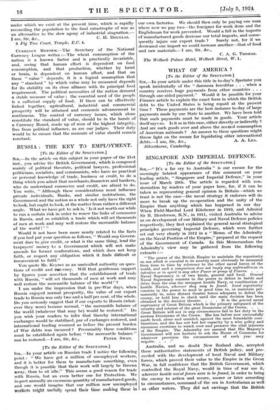RUSSIA : THE KEY TO EMPLOYMENT.
[To the Editor of the SPECTATOR.] SIR,—In the article on this subject in your paper of the 21st inst., you advise the British Government, which is composed mainly of political theorists, political lawyers, professional politicians, socialists, and communists, who have no practical or personal knowledge of trade, business or credit, to do a thing which you admit that merchants, financiers and bankers, who do understand commerce and credit, are afraid to do. You write, " Although these considerations must influence private individuals, Banks, and similar institutions, the Government and the nation as a whole not only have the right to look, but ought to look, at the matter from rather a different angle. What we have got to ask is, ' Is it not worth our while to run a certain risk in order to renew the links of commerce in Russia, and so establish a trade which will set thousands of men at work and may well restore the mercantile balance of the world 1 ' " Would it not have been more nearly related to the facts if you had put your question as follows, " Would any Govern- ment dare to give credit, or what is the same thing, lend the taxpayers' money to a Government which will not make amends for former confiscations, and which does not keep faith, or respect any obligation which it finds difficult or inconvenient to fulfil."
You quote Mr. Keynes as an unrivalled authority on ques- tions of credit and estreency. Will that gentleman support by figures your assertion that the establishment of trade with Russia, " will set thousands of men at work and may well restore the mercantile balance of the world" ?
I am under the impression that in pre-War days, when Russia enjoyed normal prosperity, the value of our export trade to Russia was only two and a half per cent. of the whole. Do you seriously suggest that if our exports to Russia (what- ever they were) became normal, " the mercantile balance of the world (whatever that may be) would be restored." Do you wish your readers to infer that thereby international exchanges would be stabilized, par of exchanges restored, and international trading resumed as before the present burden of War debts was incurred ? Presumably these conditions must be established again before " the mercantile balance "
can be restored.—I am, Sir, &c., PETER SWAN.


















































 Previous page
Previous page